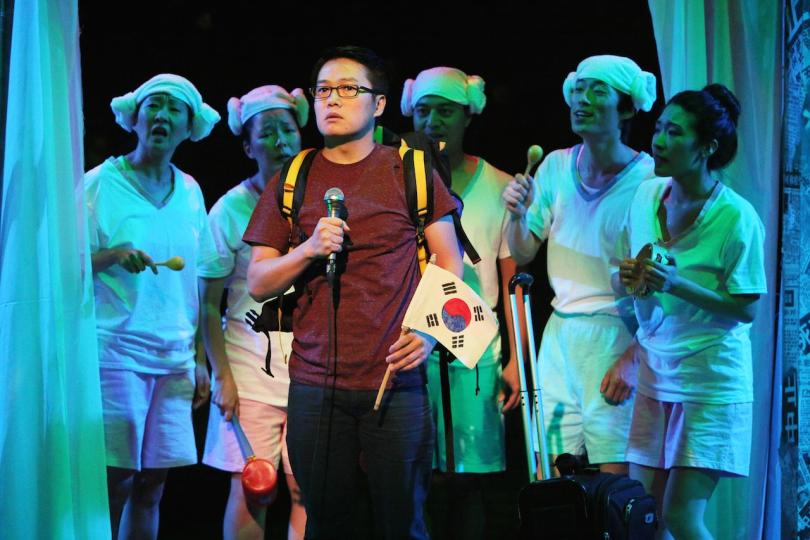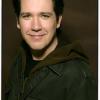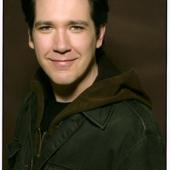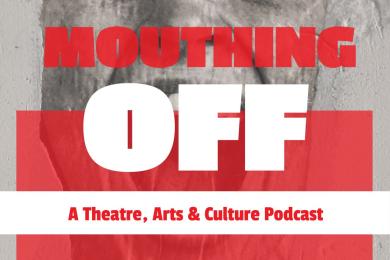Playlist profile: Eric Sharp
Interview

Eric Sharp is taking a big step. He is perhaps most identified with Mu Performing Arts where he has acted in numerous productions and is on staff. However the theatergoer who is even paying casual attention will recall his work with Frank, Park Square, Walking Shadow, Jeune Lune and the Guthrie. His dynamic presence and wicked sense of humor have earned him a spot among the Cities’ most watchable and sought after performers.
With his next project, Sharp is radically stretching himself. He is both playwright and star of Middle Brother an autobiographical work that tells the story of his journey to Korea and explores ideas of family and origin. And Sharp says that for his first time in the playwright hat, he decided not to stick with the old standby American Realism, instead using a highly physical vocabulary to tell his story. It all takes flight on September 12th at the Southern Theater.
Eric and I sat down for lunch in downtown St. Paul not long after the start of rehearsals.
How’s the show going?
The show is going better than I could have ever imagined. It’s one of those things, you just knock your head against a wall when you’re writing alone, but you have faith that when you get in the rehearsal room it’ll get better. And that’s what’s happening. I was so relieved when we started rehearsal, because it meant it wasn’t all on me anymore. I feel like I’ve written the show about six times in different versions, so I’m just happy to have the version that we’re rehearsing!
What’s it like writing a play after having been an actor for so long, and what’s it like being in the play you’ve written?
In terms of being an actor and transitioning to playwriting, and this is not a woe-is-me thing, I feel like I have the added disadvantage of knowing what kind of theater I really, really like.
How is that a disadvantage?
It’s a disadvantage because as a first time playwright it’s hard for me to put that down on paper. And so the picture is completely clear in my head, then we’ll do a workshop and they’re like, "What the hell are you talking about here?!" I’m like, "It’s clear," and they say, "Eric, it’s not clear." The process is really hard when you think you’re laying things down as clearly as possible.
And then for me it’s been interesting because it’s a very physical piece, it’s not devised, there is a script, but there is a lot of leeway and we’re building on what I’ve written in the room. Things I never could have come up with on my own, lines in Korean for instance. So it’s been this process of transitioning to the rehearsal room where things are much different than I ever could have imagined, but also knowing if someone is going in a direction that I absolutely don’t want it to go to, that, as annoying as it must be for other actors, I’m there. Usually the playwright’s not there. Not in the scene with you. And so because time is so finite… in a better situation I would have taken down the note and told them later, but I’m just telling people. I’m stopping the scene and telling them. Because we’re still in that space where I’ve told them, don’t memorize your lines guys, things are going to change.
Do you think that changes your relationship with the other actors in the piece?
Yeah, absolutely. I think they’re probably really annoyed with me. In a perfect world we would have a year to workshop this thing, but opening is right around the corner, so I don’t have the luxury of being genteel. I’m trying to put it in terms that I would appreciate as an actor, but I’m just going for it! And I’m sure that crosses all kinds of boundaries and I’m conscious of that, but at this point it’s the piece that matters. And thank God Bob [Rosen, the director] is willing to work that way. Or at least he hasn’t completely walked out yet. From the very first day of rehearsal he said, If you have an idea, I want to know what it is.
As a writer, have you found people whose voices you listen to as you develop the script?
I have a dramaturg, Jennifer Weir, who I’ve been working with, and she’s a friend and colleague at Mu. I’ve been working on the piece in earnest since 2011. So she is the voice that I hear in my head when I’m there late at night. It’s dangerous to have too many voices talking to you as a playwright, even if it’s valuable information, you just go crazy, and you don’t know what’s good anymore. Whereas with this relationship with Jen I feel so lucky. With the New Performance Program, which is funded through the Jerome Foundation, these pieces, mine included, go through a Survivor-esque sort of process and from the beginning you’re assigned a director and dramaturg which is so important.
It’s also kept me honest because I’m not a good writer, and I don’t mean that in the self-deprecating sense, I just mean I’m lazy. I don’t want to get up and write at 5a.m. I’ve tried it. It never lasts for more than a day. It’s just not how I write. And so what I found out about myself is that it’s that deadline, it’s that reading that’s coming up, and I don’t sleep two weeks before that. It’s not healthy, but it’s the deadline that gets it done. I’m starting to be ok with that. I don’t do this as a vocation. I’m not saying I would never write another play, but if I did, I wouldn’t have to turn things in for a grant panel. I can write at my own pace. Which means it’ll probably never get done.
At this point do you see yourself continuing to write pieces?
If you’re asking me right now in this moment, the answer is no! But it was such a good feeling on the first night of rehearsal to have that thing that I could actually call my play. I’m so thrilled with that. I’d like to have that feeling again, I just don’t know when.
Who are some of your favorite actors?
It’s been the people I’ve worked with in the theater. Film is so different. I can look up there and admire William H. Macy and others, but it’s not the world I live in. To answer the question more specifically, it’s those actors I’ve seen make magic happen in a rehearsal room. Steve Epp comes to mind. Kurt Kwan. I think Kurt’s one of the best actors in town. Sun Mee [Chomet] is great. And then there are people that I haven’t worked with yet that I really want to work with, like James Williams. I’d love to work with the whole Penumbra crowd. As an Asian actor, if Penumbra is going to do a show that has a character in it that’s not African American, most often it’s going to be a white character. It happens with Mu too. The theater exists as a celebration of people of color in a predominantly white environment, so the ancillary characters are going to be white. Usually.
I’m really excited because hopefully Mu and Penumbra are going to be doing some collaborating coming up.
What are some of your favorite productions or performances you’ve seen?
I saw this one man show at Edinburgh when I was there for the Fringe in 2004, and we were performing in the same building, so I guess we had comps. I can’t remember his name, which I think makes it better, he’s this unknown guy! He did this one man show called Catalpa and it was about a whaling ship that goes off course in order to rescue some slaves that are trying to escape. It’s this epic story that takes place at sea, but it’s one man and his trunk. And the moment that I always think about completely embodies the phrase theatrical magic. His trunk was on the ground and through this beautiful combination of sound, lights and a single sheet, he made the trunk become a breaching whale. It was so slow and simple, but everyone was onboard. Those are the moment I love, that remind what theater is all about.
What does your dream career look like?
That’s a tough question. Instead of a cogent thought, I can list the things I would like. I’d like to travel. I’d like to do acting work that pays me and excited me at the same time, which happens so rarely. I’d like to teach. That’s something I’ve discovered about myself in the last few years. I’ve taught through Mu and we’ve worked with English Language Learner kids in schools around St. Paul and Minneapolis. It’s really changed my life. Before that, I thought of being a teaching artist in the theater as something you do to make money, but I’d never connected it to my social justice values that have really developed since working with Mu. So now teaching’s something that I’ll always want to do. And then I just want to get to the point where I’m doing enough shows to support myself, but I don’t have to be doing a show at every given moment. I’ve realized that I need the down time. I used to think I could just be that engine, and that if I wasn’t doing that, there was something wrong with me. But it’s just not true. People are built in different ways and I feel like my pace is slower. And then lots of money.
What are some roles you look forward to or hope to play?
I’d love to play a Shakespearean lead.
And you asked earlier if I would continue writing plays, and if I was to say yes, the reason would be that I want to put Asian Americans in positions you’re not expecting to see them in. I would love to be in a piece that was like a David Mamet, underground, American Buffalo kind of thing, but that’s written specifically for Asian Americans. That’s the kind of thing that I’ve never had the opportunity to even audition for.
If you could change one thing about the world we work in what would it be?
I can only speak from my personal experience, but what I’ve found… I swear I wasn’t intending to answer all of these questions with, As an actor on color, but I do think about it a lot. As an Asian American actor I have found that since joining the union, there is much less work. Now I think the same could be true for most people, but it is precipitously less for an actor of color. Even in our own company at Mu, the calculus becomes, how many Equity actors can we afford, and that is sad to me. That an Asian American actor would be hesitant to take this great career step, or what is perceived to be that, for fear that they wouldn’t be able to work with their friend at Mu anymore. That’s not Mu’s position, it’s just the reality of money and budgets. And I’m very thankful that Mu is an Equity company period, otherwise I wouldn’t be able to work with them. But it becomes this weird thing of, If I join, who’s going to get that role that’s not Equity that I could have had? That’s terrible.
So if there’s one thing I could change, it would be that foundations and the funders have a better understanding of what it means to be a professional actor of color in this city. I think there’s so much money out there to develop talent pools and develop actors, and Mu does that and I’m thankful we do. But this is a separate problem that I see. For example, if, when Mu became an Equity company, it would have been great for a foundation to say, We recognize that this actor costs four times as much as a non-Equity actor; here’s some support to cover at least part of that.
What’s your first memory of seeing a live performance?
Charlotte’s Web at the Des Moines Civic Center. And I can’t tell you anything profound about it.
How did you start as a performer?
I’ve never been shy about being the first one to volunteer to get up and read in front of class or something. But I started at what I consider a comparatively late age. I started in eighth grade. I got the lead in a terribly politically incorrect play whose title I won’t mention. But I remember just having a ball. When you realize you have the ability to make someone laugh, that is intoxicating. We can say it’s about craft and all that, but it’s the fact that you can get a reaction that you want out of an audience at an exact moment. That’s gold! I felt that in that show in eighth grade and I never stopped.
When did you decide to make it your profession?
I think the answer in a more inspirational interview would be that I decided before college and that’s why I majored in it. But I don’t think when you come out of high school you have any idea what a career actually is. You see actors onscreen, being famous. But there’s a huge gulf between that and working actors.
So I think it didn’t come until after I’d graduated college. I’d written my five year plan: This is what I’m going to do. But I think still in my head when I’d written that plan, it was, Yeah, I’m going to do this, because what else would I do? It was never that go get ‘em passion.
I worked a contract in Colorado and then came back to Des Moines and then two weeks later moved to the Twin Cities. But it was just an accident, I moved up to visit a friend. So the answer is, I don’t remember deciding, I just knew I didn’t want to stay where I was, and I knew these were my gifts. And then you start auditioning and see what happens.
Why do you act and what keeps you going?
I think I’ll answer in two ways. I act because there’s that spark within me that needs to share my life experience with other people, without it having to be my life experience. I think people are surprised when they learn that I’m actually a pretty introverted person. The things that I do onstage are one side of me, I’m very content to walk silently out the stage door after it’s done. I’m not one of those people who’s on all the time. I have that period of time that I want to share with other people, and I like to think I put my all into that time. So that’s why I act.
What keeps me going is the fact that if I don’t do it, someone else will invariably take my place. I am by no means indispensible. As an actor of color you are occupying a space that is very rare. You are occupying a space that is going against what the majority thought is in this country. I take that responsibility very seriously. I’m not saying that I think of myself as a great actor, what I’m saying is that if I don’t get up there and do my best then the next person who comes along might not even consider that that Shakespearean lover could have been played by an Asian person. That an Asian American man can write a movement based show about his life and that doesn’t have to be a weird anomaly.
I don’t want to think about the limits. I want to think about the possibilities of how people can perceive the art on the other side. It’s important. As we’ve seen recently the world is pretty bleak. It’s about ignoring people’s voices. And it doesn’t have to be that way. It’s all related. I never think about what we do as just acting or just art. I think it feeds into representation. The stock answer is that it feeds into how white people think about people of color. But I would turn it around and say it has to do with how we see ourselves. So if I’m not there challenging people’s perceptions, nothing changes, and we’re stuck with the way things have always been done.




